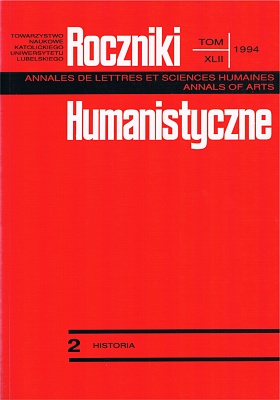Organizacja zakonnych studiów filozoficzno-teologicznych w XVII i XVIII w.
Abstrakt
This is yet another paper penned by the author on the problems of religious studies in the 17th and 18th c. Here the author deals with the question of the organization of religious studies in the 17th and 18th c. Similarly as in the previous papers he based his research on the material of the so-called religious questionnaire set up by G. Garampi, a nuncio in Poland in the period of 1773-1774, a questionnaire which is a unique source in this domain. Further material consisted of the literature concerning this subject.
The author has arrived at the following conclusion. There were two ways of organizing religious studies. In the first one the criterion constituted of some needs and possibilities which were at the disposal of particular orders and provinces. Here come into play two possibilities of organization: setting up autonomous studies for particular disciplines, i.e., dogmatic, moral theology and philosophy or else creating for them joint studies. The total number of the houses of philosophical and theological studies in 1772 was 160. The latter was shared among 15 orders (we have no data concerning the organization of 23 houses of studies). In 28 cases there were autonomous, that is existing separately, studies of dogmatic theology. 14 houses were exclusively devoted to the studies of moral theology. Moreover 46 houses were organized in such a way that they combined either dogmatic theology, moral theology and philosophy or dogmatic theology and philosophy, or else moral theology and philosophy. In 49 monasteries there were autonomous philosophical studies which were not linked with any theological discipline.
The second criterion according to which religious studies were organized was made up of some formal and legal premises. In view of this criterion one may distinguish the following studies: conventual, particular, material, formal and general. It is in the Dominican order that this division occurred in its fullest form. We find all types of studies in question in this order.
The final part of the paper deals with the question of running the houses of studies, and especially with the tasks and function of prefect, that is the regents (a name which was alternately used in particular orders) of particular houses of studies.
Copyright (c) 1994 Roczniki Humanistyczne

Utwór dostępny jest na licencji Creative Commons Uznanie autorstwa – Użycie niekomercyjne – Bez utworów zależnych 4.0 Międzynarodowe.





